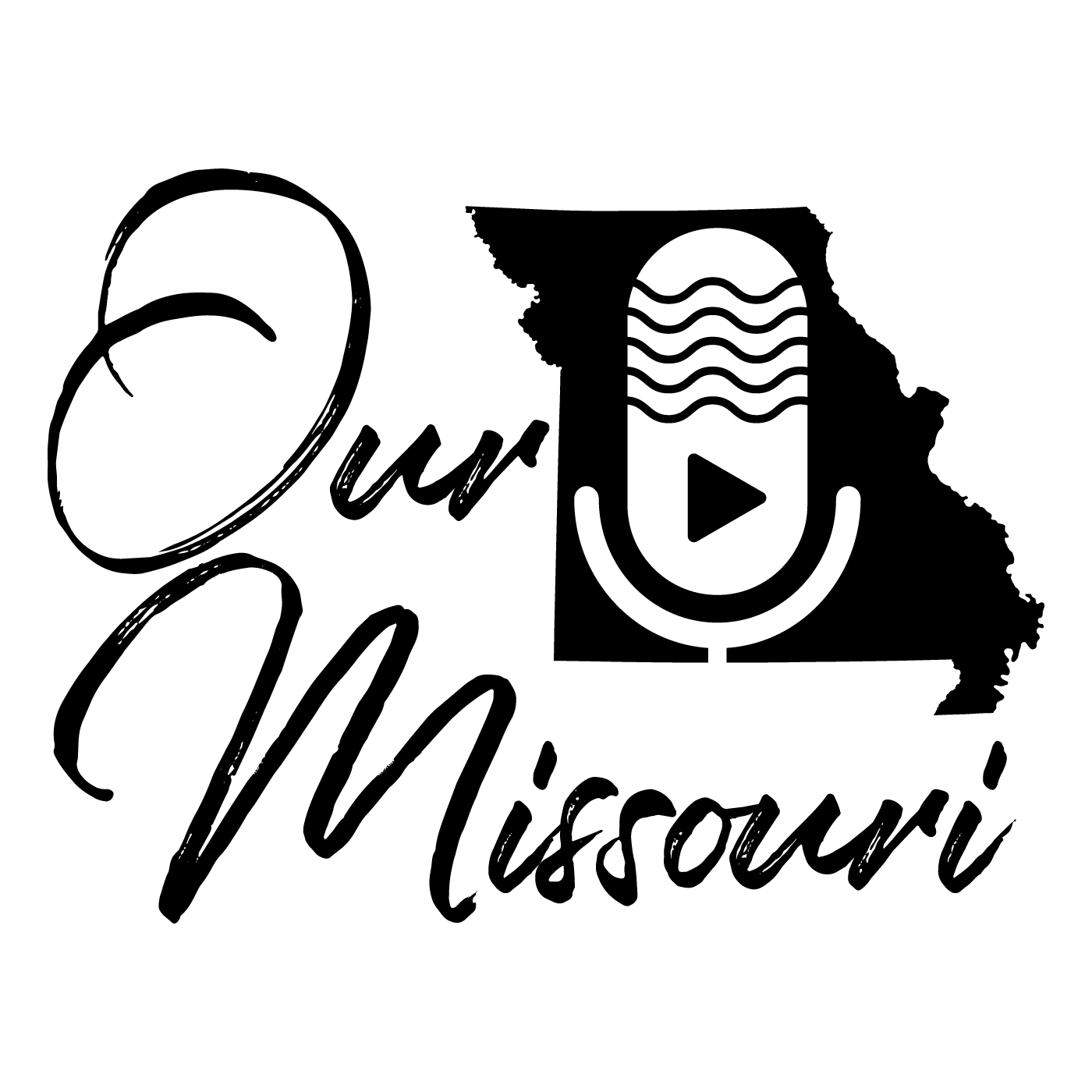Episodes
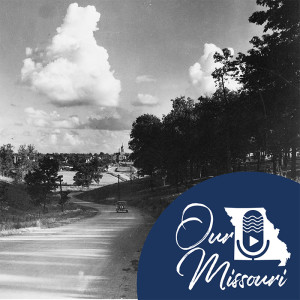
Thursday Nov 14, 2019
Episode 22: Passport to the Ozarks – Kaitlyn McConnell
Thursday Nov 14, 2019
Thursday Nov 14, 2019
Today's episode continues our multi-part series on "The Ozarks." Sure, you think you know about the Ozarks. The home of Branson, the Baldknobbers, and the Beverly Hillbillies…right? Well, in this series, we'll talk about the Ozarks—a region covering roughly half of Missouri—as a cultural identity as well as a physical place. So, come along for a trip to the Ozarks. This episode features a conversation with Kaitlyn McConnell about her efforts to preserve and promote the history of the Ozarks through her website Ozarks Alive and her recent book, "Passport to the Ozarks."
Episode Image: Car driving down a winding road in Lawrence County with Mt. Vernon, Missouri, in the distance [Charles Trefts Photographs (P0034), SHSMO]
About the Guest: A seventh-generation Ozarker, Kaitlyn McConnell began writing about the Ozarks while still in high school. Starting as a columnist for the Marshfield Mail, her research and writing on topics related to Webster County led to her selection as the History Channel's Student of the Year in 2007. Later, she served as the president of the Webster County Historical Society and authored a pictorial book on the history of Marshfield. Her most recent book, "Passport to the Ozarks," was published in November 2019. Presently, Kaitlyn curates the website Ozarks Alive as well as serving as Media Relations Manager for CoxHealth.
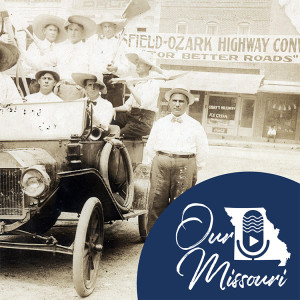
Monday Oct 28, 2019
Episode 21: "Father of Route 66" — Susan Croce Kelly
Monday Oct 28, 2019
Monday Oct 28, 2019
Today's episode continues our multi-part series on "The Ozarks." Sure, you think you know about the Ozarks. The home of Branson, the Baldknobbers, and the Beverly Hillbillies…right? Well, in this series, we'll talk about the Ozarks—a region covering roughly half of Missouri—as a cultural identity as well as a physical place. So, come along for a trip to the Ozarks. This episode features a conversation with Susan Croce Kelly about her book, Father of Route 66: The Story of Cy Avery.
Episode Image: Mansfield-Ozark Highway Convention [South Central Missouri, Photograph Collection (P1125), SHSMO]
About the Guest: Susan Croce Kelly serves as managing editor of OzarkWatch Magazine. She has spoken and written extensively on the history of Route 66, including Route 66: The Highway and Its People and Father of Route 66: The Story of Cy Avery, both published by the University of Oklahoma Press.
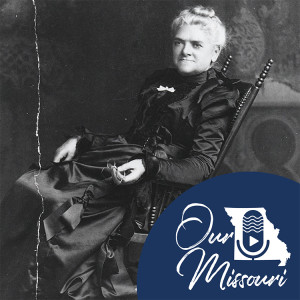
Monday Oct 14, 2019
Episode 20: Kate Franklin Newton and the Memorial to Missouri's Great Heart
Monday Oct 14, 2019
Monday Oct 14, 2019
Sure, you think you know about the Ozarks. The home of Branson, the Baldknobbers, and the Beverly Hillbillies…right? Well, in this series, we'll talk about the Ozarks—a region covering roughly half of Missouri—as a cultural identity as well as a physical place. So, come along for a trip to the Ozarks. This episode focuses on Carthage resident Kate Franklin Newton and her efforts as president of the Woman's Christian Temperance Union (WCTU) to commission a marble bust in honor of "Missouri's Great Heart," Clara C. Hoffman. Today, the Hoffman Bust resides in the art collection at the State Historical Society of Missouri's Center for Missouri Studies.
Episode Image: Clara Cleghorn Hoffman, date unknown [Woman’s Christian Temperance Union Photographs (P0907), SHSMO]
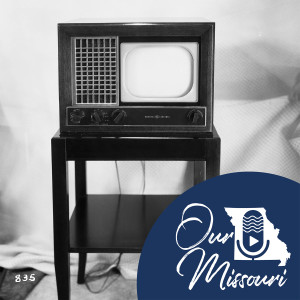
Monday Sep 30, 2019
Episode 19: "Rube Tube" – Sara K. Eskridge
Monday Sep 30, 2019
Monday Sep 30, 2019
Sure, you think you know about the Ozarks. The home of Branson, the Baldknobbers, and the Beverly Hillbillies…right? Well, in this series, we'll talk about the Ozarks—a region covering roughly half of Missouri—as a cultural identity as well as a physical place. So, come along for a trip to the Ozarks. This episode features a conversation with Sara K. Eskridge about her new book, Rube Tube: CBS and Rural Comedy in the Sixties. Published by the University of Missouri Press, Rube Tube examines the rise and fall of so-called "rural comedies"—several of which had ties to Missourian Paul Henning—as television networks like CBS sought to rebrand themselves during the turbulent decade of the 1960s.
Episode Image: General Electric television set, 1949 [Charles Trefts Photographs (P0034), SHSMO]
About the Guest: Sara K. Eskridge holds a Ph.D. in History from Louisiana State University. Presently, she serves as an instructor at Western Governors University. Her book, Rube Tube: CBS and Rural Comedy in the Sixties, was published by the University of Missouri Press in 2018.
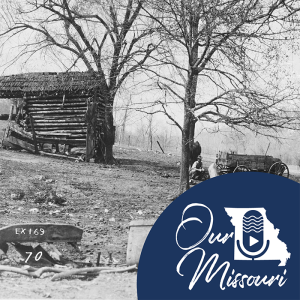
Monday Sep 16, 2019
Episode 18: "A History of the Ozarks" – Brooks Blevins
Monday Sep 16, 2019
Monday Sep 16, 2019
Sure, you think you know about the Ozarks. The home of Branson, the Baldknobbers, and the Beverly Hillbillies…right? Well, in this series, we'll talk about the Ozarks—a region covering roughly half of Missouri—as a cultural identity as well as a physical place. So, come along for a trip to the Ozarks. This episode features a conversation with Brooks Blevins about his new three-volume series on the Ozarks entitled A History of the Ozarks.
Episode Image: Scene in the Ozarks, date unknown [Charles Trefts Photographs (P0034), SHSMO]
About the Guest: Brooks Blevins holds a Ph.D. in History from Auburn University. Presently, he serves as the Noel Boyd Professor of Ozarks Studies at Missouri State University. His book, A History of the Ozarks, Volume 1: The Old Ozarks, was published by the University of Illinois Press in 2018. A History of the Ozarks, Volume 2: The Conflicted Ozarks will be released in Fall 2019.
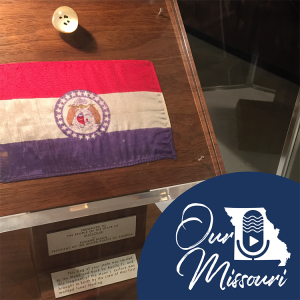
Wednesday Jul 31, 2019
Summer Series, Part 4: One Year Later
Wednesday Jul 31, 2019
Wednesday Jul 31, 2019
Fifty years ago this summer—1969 to be exact—the space race pitting the United States against the Soviet Union was reaching the proverbial finish line. The only question that remained was: Who would land on the Moon first? During our special Summer Series, we will explore the history behind the contributions made by Americans—and more specifically, Missourians—to not only explore the far reaches of space, but also to land a person on the Moon. This episode focuses on the aftermath of the Moon Landing and how NASA tried to sustain support for the space program by taking key Apollo 11 artifacts on a cross-country tour.
Episode Image: Display of moon rocks collecting during NASA Apollo missions at the Missouri State Capitol, 2019 [Courtesy of Sean Rost]
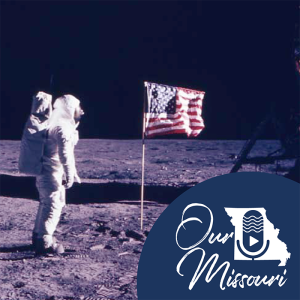
Friday Jul 19, 2019
Summer Series, Part 3: Moon Memories
Friday Jul 19, 2019
Friday Jul 19, 2019
Fifty years ago this summer—1969 to be exact—the space race pitting the United States against the Soviet Union was reaching the proverbial finish line. The only question that remained was: Who would land on the Moon first? During our special Summer Series, we will explore the history behind the contributions made by Americans—and more specifically, Missourians—to not only explore the far reaches of space, but also to land a person on the Moon. This episode focuses on Walter Cronkite and his rise from a Kansas City Star paperboy to one of the most trusted figures in journalism, especially when it came to all things NASA. We'll also re-live—through the memories of residents across the state—the culmination of the space race and the first steps on the moon.
Episode Image: Print of American flag being planted on the moon, 1969 [Ruby Rose Stauber Photographs (SP0014), SHSMO]
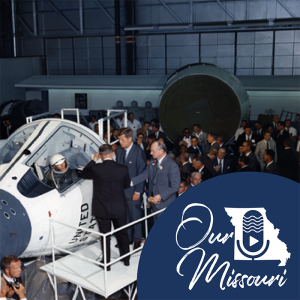
Thursday Jul 11, 2019
Summer Series, Part 2: Mr. Mac & the Race to the Moon
Thursday Jul 11, 2019
Thursday Jul 11, 2019
Fifty years ago this summer—1969 to be exact—the space race pitting the United States against the Soviet Union was reaching the proverbial finish line. The only question that remained was: Who would land on the Moon first? During our special Summer Series, we will explore the history behind the contributions made by Americans—and more specifically, Missourians—to not only explore the far reaches of space, but also to land a person on the Moon. This episode focuses on James S. McDonnell and the inner workings of McDonnell Aircraft during Project Mercury and Project Gemini.
Episode Image: President John F. Kennedy and James S. McDonnell, Jr. inspect a Project Gemini capsule, St. Louis, Missouri, 1962 [McDonnell Space Program in St. Louis Collection (S0759), SHSMO]
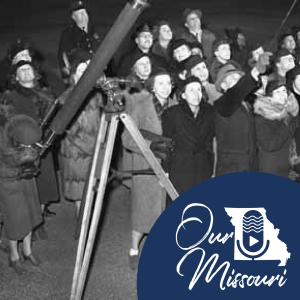
Monday Jul 01, 2019
Summer Series 2019, Part 1: Calculations
Monday Jul 01, 2019
Monday Jul 01, 2019
Fifty years ago this summer—1969 to be exact—the space race pitting the United States against the Soviet Union was reaching the proverbial finish line. The only question that remained was: Who would land on the Moon first? During our special Summer Series, we will explore the history behind the contributions made by Americans—and more specifically, Missourians—to not only explore the far reaches of space, but also to land a person on the Moon. This episode focuses on an astronomer—Edwin Hubble—and a mathematician—Dorothy Vaughan—who grew up in Missouri, but later achieved international acclaim in their respective fields.
Episode Image: A group standing near a telescope, 1939 [Arthur Witman Photograph Collection (S0717), SHSMO]
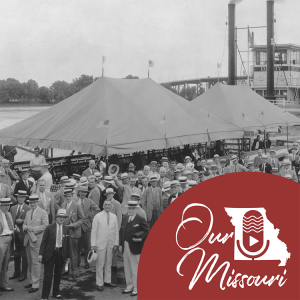
Monday May 20, 2019
Episode 17: "A River in the City of Fountains" – Amahia Mallea
Monday May 20, 2019
Monday May 20, 2019
Since its earliest days, Missouri has been defined by its rivers. While the Mississippi River gets most of the attention thanks to the literary works of authors like Mark Twain, the Missouri River is actually the longer of the two waterways and travels through more counties in the state than its counterpart. This episode features a conversation with Amahia Mallea about her new book, A River in the City of Fountains, and the complex history of the great river known as the "Big Muddy."
Episode Image: Missouri River Navigation Association, Kansas City, Missouri, 1932 [J. C. Nichols Company Scrapbooks (K0054), SHSMO]
About the Guest: Amahia Mallea is an associate professor of history at Drake University. She holds a PhD in history from the University of Missouri-Columbia. Her recent book, A River in the City of Fountains: An Environmental History of Kansas City and the Missouri River, was published by the University Press of Kansas in 2018.

